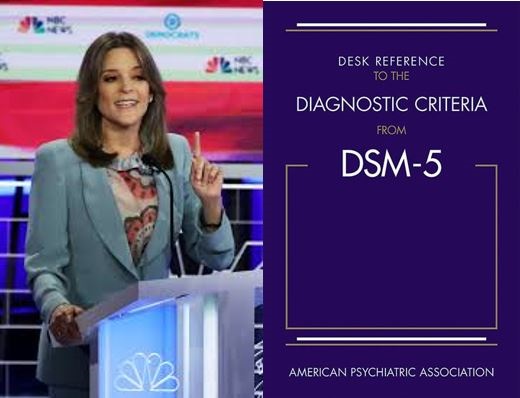
Psychiatric epidemiology has become a Presidential campaign issue! Marianne Williamson has taken some heat for her past claim that diagnosis of clinical depression is “such a scam.” She has backed away from that statement, but she’s stood by her point that “There is normal spectrum of human despair; it is a spiritual, not a medical issue.” And she’s stood by her claim that antidepressants are over-prescribed when “people are simply sad.” Is there really any difference between depression and ordinary sadness? Are antidepressants being prescribed inappropriately for “normal human despair”?
The American Psychiatric Association’s Diagnostic and Statistical Manual (or DSM-5) attempts to draw a line between depressive disorders and “periods of sadness that are inherent aspects of the human experience”. But the line DSM-5 draws can seem artificial. Why is a major depressive episode defined by five of nine specified symptoms rather than by four or six? And why must that episode last at least two weeks rather than 13 days or 15 days? There are no sharp boundaries, and Williamson’s critique about a “normal spectrum of human despair” seems reasonable.
But I think Marianne Williamson’s dismissal of depression diagnoses is built on a false premise: that real “medical” disorders are defined by sharp boundaries or discontinuities. In fact, most chronic diseases lie at one end of a normal spectrum. Diabetes, for instance, lies at the high end of the fasting glucose spectrum. Hypertension, to offer another example, lies at the high end of the blood pressure spectrum. If we require a sharp boundary or discontinuity to define a chronic illness, then most major causes of disability and premature death would be re-classified as part of a normal spectrum. In general, chronic illnesses are not caused by a single genetic error or by unbounded growth of a single rogue cell. Instead, chronic illnesses typically result from faulty regulation of complex systems. Whether or not faulty regulation leads to illness and disability depends on social environment, life events, health behaviors, and (as Williamson has noticed) spiritual practices. That’s true of depression, but it’s also true of heart disease or diabetes.
Williamson has pointed out that “There is no blood test” to diagnose depression. But the same is true of Parkinson’s Disease. The brain is more complicated than the liver or kidneys, and blood tests are just not useful to assess how it is functioning.
While I think Williamson’s arguments regarding diagnosis of depression are fundamentally flawed, I also see fundamental problems with the DSM-5 (or ICD-10) scheme for separating depressive disorders from ordinary human experience. DSM-5 criteria for diagnosing depression use one set of rules to address two very different, albeit related, questions.
The first question is about the essential features of depression. While the borders of depression may not be sharp, the core is well defined. The central psychological, behavioral, and physiological features of depression are remarkably consistent across language, culture, and social environment. Depression is not a social construction or a modern spiritual malaise. Instead, it’s a well-described disorder and the leading cause of disability worldwide. The DSM-5 gets that question right.
The second question is about drawing the line where depression becomes an illness or a disorder. Not only are there no sharp boundaries, but the answer depends on the situation. When is depression severe enough to warrant treatment? That depends on the potential benefits and risks of the treatment. The DSM-5 can’t get that question right, because the answer is “It depends.” The same question about a severity threshold for diagnosis or treatment applies to hypertension, diabetes, or nearly any chronic illness. And the answer is “It depends.”
Regarding Williamson’s claim that antidepressants are over-prescribed for “normal sadness”, we can point to some relevant epidemiology research. Data from our MHRN health systems find very little prescribing of antidepressants for minimal or mild symptoms of depression. While experts may disagree on the specific threshold above which benefits of antidepressants are clear, most people starting antidepressant medication have moderate or severe symptoms by our standard measures.
I’m a clinician and a researcher, so I’m reluctant to wade into the intersection of politics and spirituality. That’s risky territory, so I’ll step into it cautiously. I’ll stay in that territory just long enough to pull the diagnosis of depression back where it belongs – into the boring terrain of epidemiology. For better or worse, the upcoming Presidential debates will probably not include any epidemiology questions.
Greg Simon
